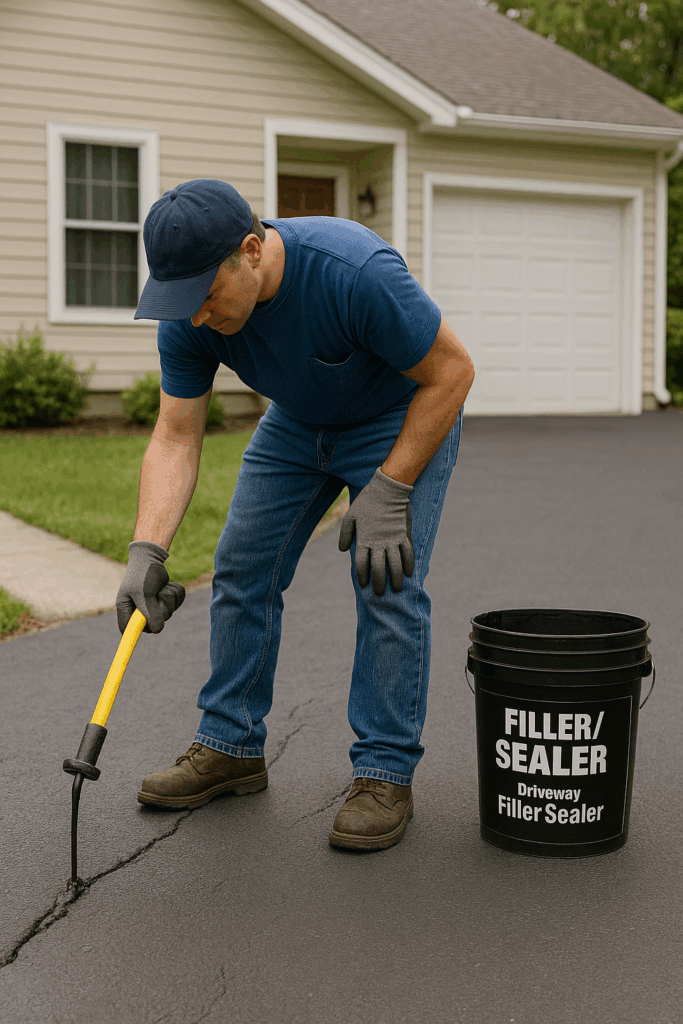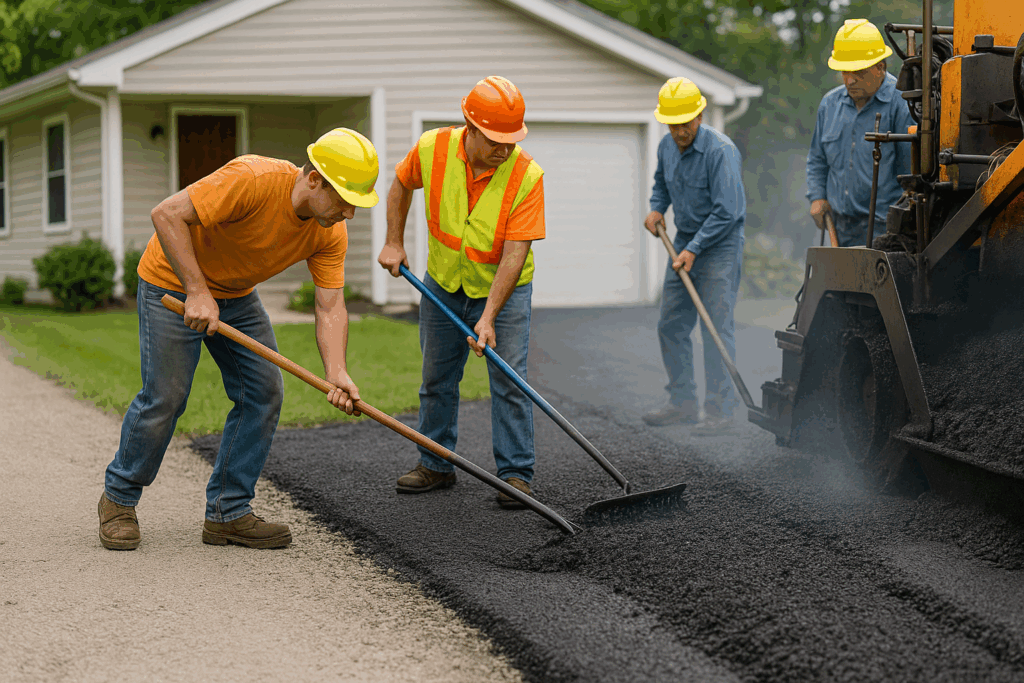Comparing Concrete vs. Asphalt Driveways – Concrete or asphalt driveway? Discover your best pick.

Analyze durability, cost, installation process, and maintenance to help homeowners choose the best driveway material.
Choosing the right driveway material can transform your home’s curb appeal, longevity, and overall cost. While both concrete and asphalt are popular choices for homeowners, they each come with unique advantages and trade-offs. In this guide, we’ll examine durability, cost, installation processes, and maintenance requirements to help you decide between concrete and asphalt driveways. By the end, you’ll have the insights needed to make an informed choice that fits your budget and long-term goals.
Durability
Concrete
Concrete driveways are known for their long lifespan—often lasting 25-30 years or more when properly installed. The rigid nature of concrete resists sagging and heavy loads better than asphalt. However, concrete can crack under freeze-thaw cycles if not mixed or poured correctly. Cracks may occur from settling soil or tree roots over time. High-quality concrete mixes with proper reinforcement (such as wire mesh or rebar) can minimize cracking, but no system is entirely crack-proof. Patching and sealing can address small cracks, but extensive damage may require partial or full resurfacing.
Asphalt
Asphalt driveways typically last 15-20 years with routine maintenance. Their flexible composition allows them to better withstand freeze-thaw cycles without major cracking. Asphalt can develop surface blemishes like potholes and depressions, especially if the subbase is improperly prepared. However, repairs are often easier: filling potholes, patching, or adding a new asphalt layer on top can restore functionality quickly. In regions with significant temperature fluctuations, asphalt’s flexibility can be a distinct advantage over concrete.
Cost Comparison
Material and Installation Costs
- Concrete: Installation costs range from \$4 to \$10 per square foot, depending on mix strength, thickness, and any decorative finishes (e.g., stamped or colored concrete). A basic 2,000-square-foot driveway might cost \$8,000 to \$20,000. Decorative options can increase labor and material costs by 20-50%.
- Asphalt: Installation costs average \$3 to \$7 per square foot. For the same 2,000-square-foot area, expect \$6,000 to \$14,000. Asphalt is generally less expensive primarily due to faster installation and lower material costs.
Labor costs for asphalt are typically lower, as the installation process is quicker—generally completed in a day or two for a standard driveway—whereas concrete might require multiple days of labor and curing time.

Long-Term Value
While concrete’s upfront cost is higher, its longevity can make it cost-effective over the long haul, especially if you plan to stay in your home for 20+ years. Asphalt’s lower initial expense can be appealing for budget-conscious homeowners, but factoring in periodic sealing (every 2-3 years) and patch repairs can add to lifetime costs. In many cases, total ownership costs for asphalt and concrete become comparable over 15-20 years.
Installation Process
Concrete Installation
- Site Preparation: Excavation down to a stable base (commonly 6-8 inches), followed by compacting a gravel subbase.
- Formwork and Reinforcement: Installing wooden forms to shape the driveway and placing wire mesh or rebar to reinforce the slab.
- Pouring and Finishing: Concrete is delivered via ready-mix trucks. Workers pour and then screed the surface for level. Techniques like stamping, brooming, or troweling create textured finishes.
- Curing: Concrete requires adequate curing time—usually 7 days for initial curing (with forms removed) and 28 days to reach full strength. During curing, the surface must stay moist (via water sprays or curing compounds) to minimize cracking.
Asphalt Installation
- Excavation and Base Prep: Similar to concrete, the subbase is excavated and compacted with gravel or crushed stone.
- Tack Coat: A light coat of liquid asphalt is applied to enhance adhesion between subbase and asphalt layer.
- Asphalt Paving: Hot-mix asphalt is poured and leveled using a paving machine. Workers use hand tools to ensure edges and transitions are smooth.
- Compaction: Heavy rollers compact the asphalt to the desired density. Compaction must happen while the asphalt is still warm to create a strong bond.
- Cooling: Asphalt hardens as it cools—typically a few hours before light foot traffic. Full curing may take weeks, but minimal wait times make the driveway usable faster.

Maintenance Requirements
Concrete Maintenance
- Cleaning: Sweep regularly and rinse spills to prevent stains. Use mild soap for oil or paint spots.
- Sealing: Apply a concrete sealer every 2-4 years to protect against water intrusion and freeze-thaw damage. Sealers also enhance color and resist stains.
- Repairing Cracks: Small cracks can be filled with concrete patch or epoxy fillers. Larger cracks may need professional repair or partial removal and repouring.
- Snow and Ice Removal: Use plastic shovels or brooms to avoid chipping. Avoid ammonium-based deicers, which can damage concrete; use calcium chloride or sand for traction.
Asphalt Maintenance
- Sealing: Seal-coat every 2-3 years to protect from UV damage, oil spills, and water intrusion, preserving flexibility and appearance.
- Crack Filling: After a hard freeze-thaw, inspect for cracks. Use asphalt crack filler to prevent water infiltration and pothole formation.
- Patching Potholes: Remove loose debris, fill with patch mix, and compact. Quick repairs prevent deeper base damage.
- Snow and Ice Removal: Asphalt is more resilient, but use plastic shovels to avoid gouging. Salt and traditional deicers are generally safe on asphalt but may cause water to pool at the surface if drainage is poor.
Pros and Cons at a Glance
| Aspect | Concrete | Asphalt |
|---|---|---|
| Durability | 25-30 years with proper install; prone to surface cracks | 15-20 years; flexible under freeze-thaw, potholes repairable |
| Upfront Cost | \$4–\$10 per sq. ft. (higher) | \$3–\$7 per sq. ft. (lower) |
| Long-Term Cost | Lower if staying long-term, but higher repair costs | Modest periodic maintenance; total can match concrete |
| Installation | Slower (pour, level, cure); minimal use for days | Faster (pave, roll); usable within hours |
| Maintenance | Sealing every 2-4 years, crack repair, avoid harsh deicers | Seal-coat every 2-3 years, crack fill, easy patching |
| Aesthetics | Sleek, customizable finishes; lighter color | Classic black appearance; not easily colored |
| Climate Suitability | Best for hotter climates; can crack in freeze-thaw | Ideal for colder climates; handles freeze-thaw better |
Which Should You Choose?
When selecting between concrete and asphalt, consider:
- Budget: If your budget is tight, asphalt’s lower upfront cost may appeal. Over time, factor in sealing and patching costs.
- Climate: In colder regions with frequent freeze-thaw cycles, asphalt’s flexibility may reduce cracks. In warmer, drier areas, concrete’s rigidity shines.
- Appearance: Concrete offers more customization—stamped patterns, decorative coloring, and smoother texture. Asphalt maintains a classic dark look that some homeowners prefer.
- Usage: For heavy loads (commercial vehicles or large trucks), thicker concrete with reinforcement handles weight well. Asphalt can soften in extreme heat under heavy loads, though adding a higher grade mix mitigates this.
Ultimately, both materials provide durable, functional driveways when installed and maintained properly. If you plan to reside in your home for decades and favor a sleek, personalized look, concrete could be your best investment. If you want a cost-effective option with quicker installation and easier seasonal repairs, asphalt may suit you better. By evaluating your climate, budget, and aesthetic preferences, you can confidently choose the driveway material that delivers lasting value and curb appeal.
für binance anmelden
I don’t think the title of your article matches the content lol. Just kidding, mainly because I had some doubts after reading the article.
gratis binance-konto
Your point of view caught my eye and was very interesting. Thanks. I have a question for you.
Create a free account
I don’t think the title of your article matches the content lol. Just kidding, mainly because I had some doubts after reading the article.
Kostenlos anmelden
Thanks for sharing. I read many of your blog posts, cool, your blog is very good.